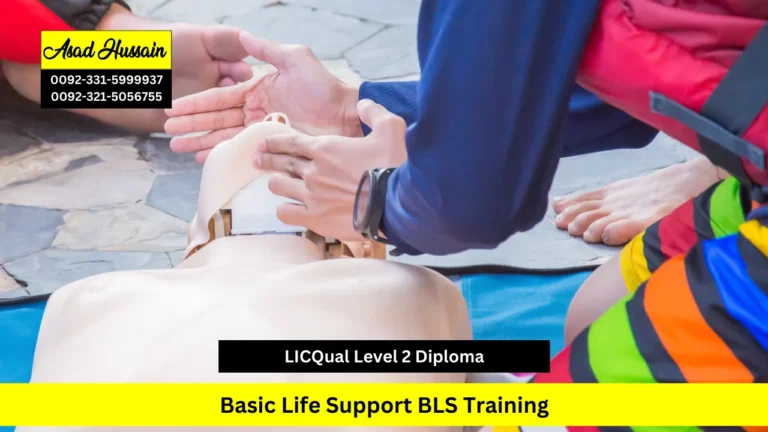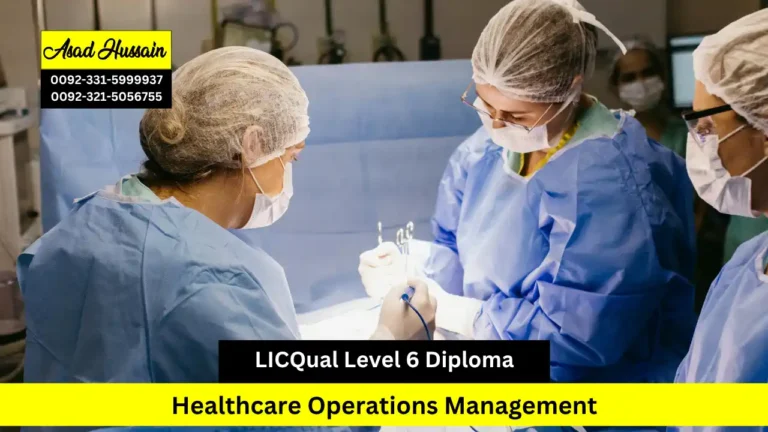The QualCert Level 3 Diploma in Quality Assurance (QA) is a vital program designed to equip learners with foundational knowledge and practical skills in quality management and assurance. In today’s competitive business environment, maintaining high standards of quality is essential for organizational success, regulatory compliance, and customer satisfaction. This course provides learners with the tools and techniques to effectively monitor, assess, and improve processes across various industries.
QualCert Level 3 Diploma in Quality Assurance (QA) covers essential quality assurance principles, including quality control tools, auditing practices, documentation, and compliance procedures. Learners will gain hands-on experience in applying quality management standards, conducting internal audits, and implementing process improvement strategies. The QualCert Level 3 Diploma in Quality Assurance (QA) emphasizes both theoretical understanding and practical application, ensuring that participants can confidently translate knowledge into real-world organizational improvements.
By completing QualCert Level 3 Diploma in Quality Assurance (QA), learners will develop critical skills in quality assessment, report preparation, problem-solving, and team collaboration. Participants will also understand the importance of ethical practices and regulatory adherence within quality assurance frameworks. The QualCert Level 3 Diploma in QA serves as an ideal stepping stone for those seeking entry-level positions in quality management, auditing, or process improvement, and it provides a strong foundation for further advanced QA qualifications.
QualCert Level 3 Diploma in Quality Assurance (QA) is suitable for professionals, graduates, and career changers who wish to build a solid understanding of quality assurance principles, enhance their career prospects, and contribute effectively to maintaining high standards within their organizations. By combining theoretical knowledge with practical application, the course ensures learners are well-prepared to excel in the field of quality assurance.
Program Highlights
Mandatory Units
- Introduction to QA and Compliance
- Basic Quality Control Methods
- Understanding QA Documentation
- Introduction to Auditing in QA
- Process Improvement Techniques
- Communication in QA
To ensure candidates are well-prepared and meet the international standards for the QualCert Level 3 Diploma in Quality Assurance (QA), the following entry requirements are expected:
Age Requirements
- Minimum age of 18 years at the time of enrollment.
- Mature learners above 21 years are encouraged to apply, especially if they possess relevant professional experience.
Educational Requirements
- Completion of secondary education (high school diploma or equivalent).
- Prior completion of a Level 2 qualification in Quality Assurance or related field is advantageous.
Professional Experience
- Preferably 6–12 months of work experience in a quality control, compliance, or administrative role.
- Experience in auditing, documentation management, or process monitoring is highly valued.
English Language Proficiency
- Must have a good command of English, both written and spoken, for effective learning.
- Ability to read, interpret, and write QA documentation accurately.
Upon successful completion of the QualCert Level 3 Diploma in Quality Assurance (QA), learners will gain comprehensive knowledge, practical skills, and professional competencies to excel in quality assurance roles across industries. This program is designed to equip learners with a strong foundation in QA principles, compliance, documentation, auditing, process improvement, and effective communication, aligned with international education and professional standards.
1. Introduction to QA and Compliance
- Understand the fundamental concepts of quality assurance and its role in organizational success.
- Identify international and national QA standards, frameworks, and regulatory requirements.
- Explain the relationship between QA, compliance, and organizational governance.
- Recognize the ethical responsibilities and professional conduct expected in QA roles.
- Evaluate the impact of QA practices on product quality, service delivery, and customer satisfaction.
2. Basic Quality Control Methods
- Apply essential quality control techniques to monitor processes and products effectively.
- Demonstrate the use of statistical tools and measurements for quality assessment.
- Identify common defects and implement corrective actions to maintain quality standards.
- Analyze quality performance data to support decision-making and continuous improvement.
- Compare different quality control methodologies and determine their suitability for specific contexts.
3. Understanding QA Documentation
- Develop, organize, and maintain QA documentation such as SOPs, checklists, and manuals.
- Interpret quality policies, procedures, and compliance documents accurately.
- Ensure proper record-keeping and documentation to meet regulatory and audit requirements.
- Evaluate documentation for completeness, clarity, and adherence to QA standards.
- Utilize digital tools to create and manage QA documentation efficiently.
4. Introduction to Auditing in QA
- Understand the principles and purpose of internal and external quality audits.
- Plan, conduct, and report audits in accordance with recognized QA standards.
- Identify non-conformities and recommend appropriate corrective actions.
- Evaluate the effectiveness of audit processes in improving organizational performance.
- Develop skills to participate in audit teams and communicate findings professionally.
5. Process Improvement Techniques
- Apply process improvement methodologies such as Lean, Six Sigma, and PDCA cycles.
- Analyze workflows to identify inefficiencies, bottlenecks, and areas for improvement.
- Implement practical strategies to enhance operational efficiency and product quality.
- Monitor the outcomes of process improvement initiatives to ensure sustainable results.
- Collaborate with teams to foster a culture of continuous improvement and innovation.
6. Communication in QA
- Demonstrate effective verbal and written communication skills in QA contexts.
- Prepare clear and concise reports, summaries, and presentations for management and stakeholders.
- Develop interpersonal skills to work collaboratively within QA and cross-functional teams.
- Address conflicts and provide constructive feedback to support quality initiatives.
- Promote awareness of QA principles and best practices across the organization.
Upon completing this program, learners will possess a robust understanding of quality assurance principles, practical skills to implement and monitor QA processes, and the ability to contribute effectively to organizational compliance, process improvement, and continuous quality development. The QualCert Level 3 Diploma in QA equips learners to advance in QA roles, undertake professional audits, and implement industry-standard quality practices confidently.
The QualCert Level 3 Diploma in Quality Assurance (QA) is designed for individuals who are committed to developing expertise in quality assurance, compliance, and process improvement across various industries. This course caters to learners with diverse professional backgrounds, whether they are starting their career, seeking advancement, or transitioning into quality-focused roles. The ideal learner is proactive, detail-oriented, and motivated to apply QA principles to enhance organizational performance and standards.
Educational Instructors and Trainers
- Professionals involved in teaching or training who want to incorporate QA principles into their curriculum.
- Individuals responsible for developing training materials that meet quality standards.
- Trainers seeking to improve evaluation methods and assessment accuracy.
- Educators aiming to align their programs with international QA frameworks.
- Those looking to provide guidance on compliance, audits, and process improvements in educational settings.
Environmental Advocates and Activists
- Individuals interested in ensuring environmental projects meet quality and compliance standards.
- Advocates aiming to implement QA processes in sustainability initiatives.
- Professionals working with NGOs to monitor, evaluate, and report environmental project outcomes.
- Those seeking to improve stakeholder trust through transparent QA practices.
- Activists looking to integrate standardized quality systems in environmental advocacy work.
Research and Development Teams
- Professionals involved in product development who want to ensure quality throughout the R&D process.
- Team members aiming to implement QA methodologies to enhance product reliability and safety.
- Researchers looking to comply with regulatory standards and international guidelines.
- R&D staff responsible for documenting procedures, testing protocols, and results.
- Individuals seeking to minimize errors and improve efficiency through structured QA practices.
Corporate Social Responsibility (CSR) Professionals
- CSR managers and coordinators looking to ensure programs meet quality and compliance benchmarks.
- Professionals seeking to improve reporting and accountability standards in CSR initiatives.
- Those aiming to align CSR activities with organizational QA frameworks.
- Individuals responsible for monitoring, evaluating, and improving CSR outcomes.
- CSR staff seeking professional development in structured process and quality assessment methods.
Students and Recent Graduates
- Learners seeking to build foundational knowledge in quality assurance and compliance.
- Graduates aiming to enhance employability in QA, audit, and process improvement roles.
- Students interested in understanding industry-standard QA processes and documentation.
- Those seeking hands-on skills applicable in multiple sectors, including manufacturing, service, and corporate environments.
- Learners looking to establish a professional pathway in quality management and auditing.
Career Changers
- Professionals transitioning from unrelated fields into QA and quality management roles.
- Individuals seeking to acquire skills in compliance, auditing, and process improvement.
- Those looking to gain internationally recognized credentials to boost career opportunities.
- Career changers aiming to contribute effectively to quality assurance initiatives in organizations.
- Learners seeking structured training that bridges existing experience with QA expertise.
Policy Makers and Regulators
- Government officials and regulators who need to understand QA principles in industry oversight.
- Individuals responsible for developing, monitoring, or enforcing quality-related policies.
- Professionals aiming to implement auditing and compliance frameworks within regulatory bodies.
- Policy makers seeking knowledge of international QA standards and documentation practices.
- Regulators looking to enhance their ability to evaluate and improve organizational quality processes.
The QualCert Level 3 Diploma in QA is ideally suited for anyone motivated to enhance organizational quality, ensure compliance, and implement best practices across industries. Learners from diverse backgrounds, including education, research, CSR, environmental advocacy, and policy-making, will benefit from the practical knowledge, technical skills, and professional competencies offered by this internationally aligned program.






